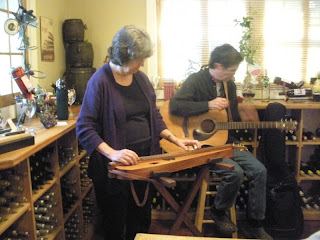
Please welcome Five Star author Peggy Ehrhart, author of Sweet Man is Gone, and her newest book, Got No Friend Anyhow.
Could you tell us about your book (title) the characters and the plot line:
Got No Friend Anyhow is my second Five Star mystery. It’s an amateur-sleuth mystery featuring blues-singer sleuth Elizabeth “Maxx” Maxwell. Like Sweet Man Is Gone, the first book in the series, it’s set against a background of Manhattan rehearsal studios and blues clubs, and it delves into the sometimes gritty, but also amusing, lives of characters who devote all their energies to making music. In Got No Friend Anyhow, Maxx’s band has been working on a CD. But when it’s nearly finished, the producer disappears and later turns up dead. To complicate matters, Maxx had been romantically involved with him. The cops believe that he was involved in pirating CDs and was killed in a mob territory battle. Maxx knew him too well to believe that he would deprive musicians of their livelihood by stealing music, and she sets about trying to clear his name. Her sleuthing leads her to the sad secret he’d been hiding.
What are your plans for a series?
I hope there will be many more Maxx Maxwell mysteries. I already have a draft of the next one.
What inspired the novel? What was the seed for the story?
The series in general was inspired by my own guitar-playing hobby. Twenty years ago my son was taking guitar lessons and it looked like so much fun that I bought an electric guitar and started taking lessons too. One thing led to another and I formed a band that played gigs in New Jersey, where I live, and in New York City. The tensions in the band eventually caused it to break up, but I got a great glimpse into the lives of struggling musicians and the kinds of pressures that can build up when people are working together to create music. I tend to look on the funny side of life though, so in my books I mostly have fun with the eccentricities of my musician characters. And I really enjoy sketching out the atmosphere of blues clubs and rehearsal studios. That world is a hidden subculture in Manhattan.
How did you write it? Over a long period, or did you have the story in your mind?
I finished Got No Friend Anyhow before Sweet Man Is Gone was published. Each of those books took about a year to write. I make detailed outlines before I start to write. The style of mystery that I’ve always liked is the tightly plotted traditional mystery, with multiple suspects, lots of red herrings, and many twists and turns. I’m not sure I could write that kind of book unless I worked out very carefully at the beginning who all the suspects will be and what kinds of clues will point to them. Once I’ve got the book outlined I can sit down and write a scene every day. But the outlining can take a few months or even more.
Tell us about your writing background. How did you start writing novels? What was your journey to publication?
I was probably destined to be a writer. I read constantly as a child, and in school whenever there was a writing project or a contest it was assumed that whatever I came up with would be the most interesting and would probably win. My secret dream was always to write fiction but I made a detour through graduate school—I have a Ph.D. in medieval literature. All through graduate school and for a few decades after that, my writing efforts were focused on scholarly projects. I enjoyed this work very much, and doing scholarly writing gave me a lot of self-discipline. I learned that it’s possible to sit down and work even if one isn’t in the mood. I read mysteries for relaxation while I was in grad school and I got to really love the form, especially classic mysteries like those of Dorothy Sayers. Right around the same time that I started playing the guitar, I wrote my first mystery. I think inside I was longing for some type of creative expression. It took awhile to write a publishable mystery and I was delighted when I sold Sweet Man Is Gone to Five Star, and also delighted that they wanted to publish Got No Friend Anyhow.
Where can readers find your books?
Got No Friend Anyhow is due out at the end of January. It will be available on Amazon and Barnes&Noble.com, as well as in many libraries—since Five Star markets primarily to libraries. Sweet Man Is Gone came out in 2008 and is now out of print, but copies are still available from Amazon and Barnes&Noble.com. It’s also available on Kindle and Nook, from the Apple iBookstore, and in other ebook formats from The Digital Bookshop and a variety of ebook retailers.
Please visit Peggy's website for more information. Thanks, Peggy, and good luck with your release!


























